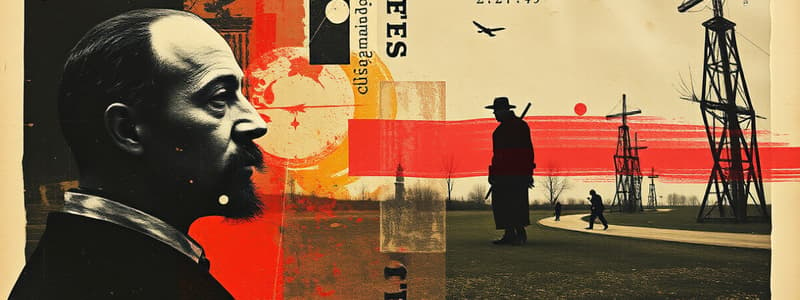Podcast
Questions and Answers
What is Banquo's primary concern regarding the witches' prophecy?
What is Banquo's primary concern regarding the witches' prophecy?
- That it may also come true for him and his descendants. (correct)
- That it signifies the end of his honor.
- That Macbeth will fulfill the prophecy through his own ambition.
- That he will be forced to confront Macbeth about Duncan's murder.
Why does Macbeth feel the need to kill Banquo?
Why does Macbeth feel the need to kill Banquo?
- He believes Banquo holds the key to controlling the throne.
- He resents Banquo's honor and views him as a threat due to the prophecy. (correct)
- He wishes to eliminate all witnesses to Duncan's murder.
- He wants to take Banquo's title and lands.
What tactic does Macbeth use to persuade the murderers to kill Banquo?
What tactic does Macbeth use to persuade the murderers to kill Banquo?
- He appeals to their sense of loyalty to him.
- He questions their manhood to inspire them to act. (correct)
- He offers them a significant financial reward.
- He threatens them with dire consequences if they refuse.
What motivates Macbeth's guilt that leads him to consider further violence?
What motivates Macbeth's guilt that leads him to consider further violence?
How does Banquo respond to Macbeth's invitation to the feast?
How does Banquo respond to Macbeth's invitation to the feast?
Flashcards are hidden until you start studying
Study Notes
Banquo's Suspicion
- Banquo expresses doubt about Macbeth's rise to power, suspecting foul play in fulfilling the witches' prophecy.
- He contemplates the potential for the prophecy to be equally valid for his own lineage, highlighting his ambivalence between suspicion and ambition.
Macbeth's Manipulation
- Macbeth invites Banquo to a feast, demonstrating a facade of camaraderie, while plotting his demise.
- Banquo plans to ride for business, taking his son Fleance along, which increases Macbeth's motive for murder since both threaten his throne.
Macbeth's Inner Turmoil
- Alone, Macbeth reflects on the consequences of his actions, revealing his anxieties about Banquo's descendants inheriting the throne.
- His desire to kill Banquo stems from jealousy and the need to ensure his actions do not lead to a wasted murder of Duncan.
Guilt and Ambition
- Macbeth's guilt over Duncan's murder drives him to contemplate another killing, as he seeks to validate his earlier decision through further violence.
- This cycle of guilt and ambition shows Macbeth’s moral decay and desperate need to secure his power.
Recruitment of Murderers
- Macbeth enlists two murderers by blaming Banquo for their poverty and questioning their masculinity, a manipulation tactic reminiscent of Lady Macbeth’s influence on him.
- The murderers' agreement to kill both Banquo and Fleance signifies Macbeth's spiraling descent into moral corruption and treachery.
Studying That Suits You
Use AI to generate personalized quizzes and flashcards to suit your learning preferences.




